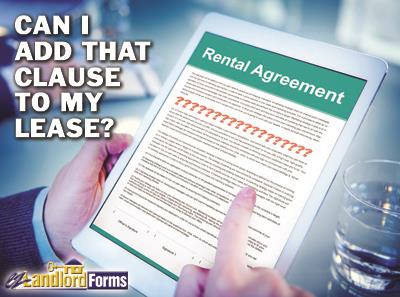
With hundreds of thousands of landlords across the United States, there are few tenant issues that haven't been encountered by someone, somewhere, at some time. And out of those experiences come new lease clauses.
At the very least, rental agreements or leases – terms we use interchangeably here – cover dates, rent and security deposit amounts and who pays utilities. Clauses modify and expand those basic terms, just as they do in any contract. A clause can be a short sentence setting out a rule about parking. It can be a complete addendum that lists requirements, and any no-nos, for the handling of trash and recyclables.
An addendum (more than one and they're called addenda) is simply an addition to the other terms in the lease. They are attached at the bottom of the lease because they typically contain too much information to be added in a sentence. A tenant is expected to sign or initial addenda when adding his or her signature to the lease.
Clauses and addenda can make things clear for both the landlord and tenant. They strengthen rental agreements and protect both parties from misunderstandings as long as terms do not violate state or province laws. When clauses and addenda are violated, the parties have a recourse, or the right to turn to the courts for justice.
Which clauses or addenda should I use?
There are three important areas to consider as you select the appropriate clauses and addenda for your lease:
- Location and demographics. Is your rental property in a college town where students are apt to be your tenants? If so, you'll be a step ahead with an addendum that lists rules on parties. Do you live in a big city where many people are likely to be sharing common space with your tenants, such as parking, courtyards and laundry facilities? If so, a clause that explains how those spaces must be shared would enhance the rental agreement. And any city will have bed bugs, no matter how clean the property, so a bed bug addendum is the perfect tool for stating exact steps tenants must take if they confront that problem.
- Rental property features. Does your rental have amenities like a pool, wood stove or generous parking that would allow multiple cars, a boat or RV? Each of those features can be abused unless rules for their use are listed in a clause or addendum. If you agree that a tenant with professional tradesman skill may paint, repair or perform other renovations on your rental property in exchange for reduced rent, an addendum can specify the work that will be done and a schedule for its completion.
- Past Experience. Many landlords adjust their rental agreements after each tenant. Why? Because they confronted a new situation with the last tenant and learned that they need to be better prepared. Perhaps the last tenant had a friend visit; the friend stayed for weeks, then months, but never paid any rent. Or, the tenant said there would be one small dog living in the unit, but then acquired two new, much larger dogs. A guest addendum and pet addendum, respectively, could be included in future leases so that if those situations come up, the tenant knows where the landlord stands.
Can you make your own addenda?
What if the typical clauses and addenda don't cover an issue you faced with your last tenant, or a feature on your rental property? Then, you design your own.
Wording of a custom addendum is a personal matter but must address a specific issue and clearly list the rules and the consequences for violating them.
For instance, if an area of the property is off limits to the tenant – say a basement, attic or closet – then a clause could state that those areas may not be used by the tenant. Maybe you have extensive landscaping that you don't want the tenant to disturb; spell it out in a clause. In fact, an addendum is the perfect tool for laying out your expectations for care outside the home, both with mowing the grass and timely snow shoveling.
If an issue crops up after a lease has begun, you can still add a clause or addendum. You will just need to send your tenant written notice of the change, preferably with a lease amendment, and then get your tenant's signature on the new amendment.
Remember that a lease is not a static, unchanging instrument. It is meant to be updated over time. So, with each new tenant, review the agreement you used with the last tenant. Look for holes that need to be filled with a new clause. Search for areas that could be better worded so there is no confusion over what is expected.